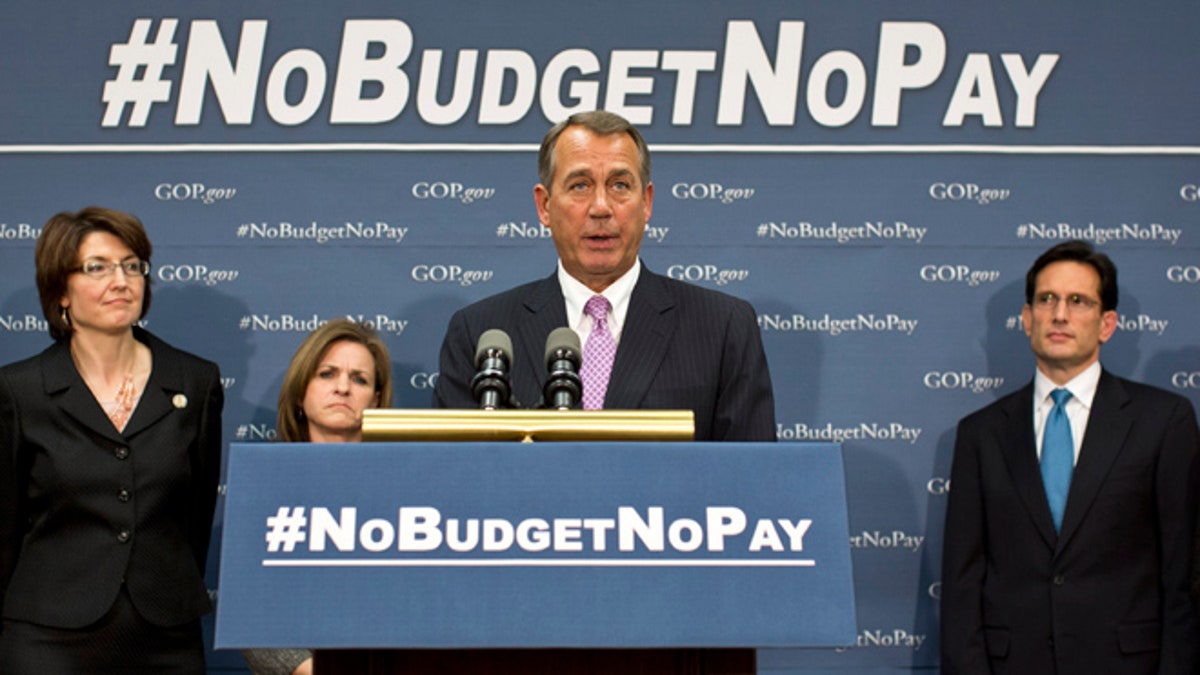
Jan. 22, 2013: Speaker of the House John Boehner and the House GOP leadership speak to reporters on Capitol Hill. (AP)
House Republicans were lining up behind a debt ceiling proposal that would extend the nation's borrowing limit temporarily while emphasizing the need for Congress to pass a budget.
The plan is expected to pass Wednesday in the House when Republican leaders put it up for a vote, and the White House has signaled it wouldn't stand in the way of passage. Some Democratic lawmakers have raised objections, but it is not clear whether they are a strong enough voice to stop the proposal in the Democratic-controlled Senate.
Republicans, in shifting gears in their fight against government spending and the rising debt load, have attempted to pitch their new plan as a solid step toward fiscal stability -- and they have pushed to withhold congressional pay if lawmakers don't act.
Under the proposal, Congress would withhold the pay of lawmakers in the House or the Senate if their chamber fails to pass a budget by April 15. The Republican plan would also allow the government to keep borrowing through May 18.
"Over the last four years, House Republicans have offered plans. Our budget plans -- we've done our budgets. But it's been nearly four years since the Senate has done a budget," Speaker John Boehner said Tuesday. "Most Americans believe: you don't do your job, you shouldn't get paid. That's the basis for a no-budget, no pay. It's time for the Senate to act."
The debt ceiling poses the first legislative battle of President Obama's second term and one that could determine whether the country once again risks default over a political fight.
House Republicans have passed budgets for two consecutive years, but the Senate hasn't passed one since Obama's first year in office.
A Fox News source who attended a meeting between Republican leaders and caucus members said Boehner tried to sell the short-term debt ceiling increase as a way of buying time for the House and Senate to pass a budget.
But the so-called "no budget, no pay" provision has run into complaints that it's not constitutional. Critics point to the 27th Amendment, which states: "No law, varying the compensation for the services of the Senators and Representatives, shall take effect, until an election of Representatives shall have intervened."
Rep. Hakeem Jeffries, D-N.Y., said Monday "it appears that the 27th Amendment does not permit Congress to alter its pay in the midst of a current session."
House Republican leadership is defending the plan. A GOP leadership aide told Fox News that members would ultimately get paid, since "constitutionally we have to pay members." The suggestion is that the plan would not violate the 27th Amendment because it would temporarily withhold pay, as opposed to reducing pay. Under the plan, members' pay would be put in escrow starting on April 15 for any chamber that hasn't passed a budget resolution.
As for the debt ceiling provision, the legislation does not set a specific limit; rather it would automatically increase the limit by the amount required to fund U.S. government obligations through May 18.
White House Press Secretary Jay Carney said Tuesday that Obama would not block the bill if it passes.
Democrats in Congress have generally reacted coolly to the three-month extension, which would still leave other choke points in place, including sharp, across-the-board spending cuts that would start to strike the Pentagon and domestic programs alike on March 1 and the possibility of a partial government shutdown with the expiration of a temporary budget measure on March 27.
But failing to meet those deadlines would have far less serious consequences than defaulting on U.S. obligations like payments to bondholders.
Obama has vowed he would not bargain over the debt limit. If the debt cap is not raised, the government would default on its obligations by as early as Feb. 15, Treasury says.
Fox News' Chad Pergram and The Associated Press contributed to this report.




